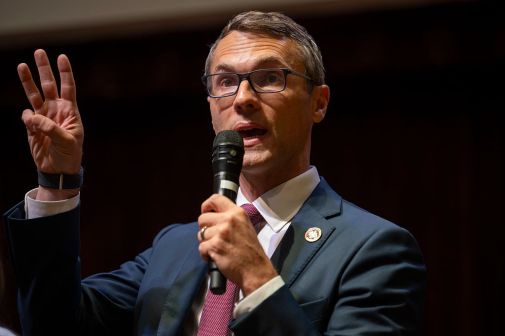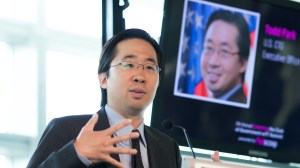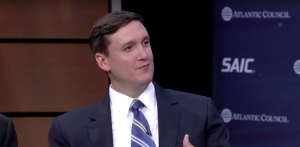Demo Day displays Washington’s role in startup community
Normally, Declara CEO Ramona Pierson would attend a demo day looking to tell her story and secure investors. Tuesday, she spent her time doing something different: Pitching her company to President Barack Obama in the East Room of the White House.
Obama met with Pierson, a former Marine, who got the idea for her company while she was recovering from a drunk driving accident that put her in a coma for 18 months. She said the older residents in her hospice center helped her think differently about how people connect, ultimately forming the basis for her online learning platform.
“It’s sort of like a Google meets Facebook, but there’s all kind of stuff to it,” Obama said of Declara, speaking to a room full of entrepreneurs at the White House. “Ramona was explaining it to me and it was fascinating, and I understood about half of it.”
The demo day, the first the White House has hosted, is part of a larger effort by the Obama administration to play a greater role in encouraging the growth of U.S. startups. Obama and the rest of Washington may not always understand the technical details of a startup’s product, but the government needs to help good ideas flourish, he said.
Some of the participating startups said the government’s help during their early stages was crucial to their success.
Jeanette Hill, CEO of Spot On Sciences, wouldn’t have been able to create her company’s product HemaSpot — a matchbook-sized blood collection device that can be stored and shipped to labs without any need for temperature control — without some initial help from federal agencies. Small business innovation research grants from the Defense Advanced Research Projects Agency and the National Institutes of Health helped Hill grow her products into a full-fledged operation.
The government “funded us through a small grant when this was just an idea,” Hill told FedScoop. “They’ve been very supportive since, helping us interact with other NGOs and government groups and getting us into a lot of different studies.”
The same was true for Pittsburgh-based Astrobotic Technology. A NASA small business grant for $795,000 in 2011 helped the company go from prototype to product, Astrobotic’s Jackie Erickson said. Now, the company is involved in a number of NASA contracts — some tied to the Lunar Catalyst program, which helps develop commercial robotic lunar lander capabilities.
Erickson said without NASA, the company would never have been able to fulfill its mission to “make the Moon accessible to the world.”
“The Lunar Catalyst program is amazing,” Erickson said. “We have access to people that have flight experience and work with these software programs. For us to build our own flight software program, that would take years. We can go to [NASA] labs, we can go to their facilities, we work hand-and-hand with them.”
Even if the government did not financially support some of the showcased startups, entrepreneurs have still found ways to tap into problems the government has been trying to solve for years.
Jerome Hardaway created Frago after struggling to find work when he left the Air Force. Now, he teaches veterans front-end Web development.
“When I got out of the military, no one would hire me because they felt that I did not have skills,” Hardaway said. “Even though that was grotesquely untrue, I learned to adapt.”
Hardaway bases his coding courses on training methods he learned from the military to help his students adjust to the new type of work. Based out of Memphis, Hardaway said he was blown away by the White House’s recognition.
“When you are in the smaller fishbowl cities, it’s really hard to see the light at the end of the tunnel,” Hardaway said. “Being contacted was an honor in itself. Secondly, being here today as a veteran, being recognized of wanting to help veterans, that’s amazing.”
As part of the event, the White House announced an initiative to promote diversity in the tech workforce. It also highlighted efforts to help veterans. Incubators like Chicago’s 1871 touted new programs that catered to veteran entrepreneurs, while online learning platform Coursera will offer veterans one free course certificate in fields like data science or cybersecurity.
Those classes could be key to launching businesses like Base Directory, an app that lets service members track information on amenities and services on bases around the globe. Chief Operating Officer and former Navy surface warfare officer Billy Griffin said he and founder Tony Hatala revamped their app after a six-month coding course in Denver, borrowing a model from the popular U.S. Digital Service to create better ways for users to access their data.
“If everyone is experiencing the same problem, let’s standardize it across service branches and bases, and collect that data the same way the U.S. Digital Service has rebuilt some applications and made the data more publicly accessible,” Griffin said.
Speaking at the event, Obama said that with the government’s guidance, the wave of entrepreneurship the United States is experiencing can lift everyone to the American Dream.
“Ideas can come from anybody and anywhere, and can be inspired by any kind of life experience,” Obama said. “We’ve got to judge those ideas on their merits. We’ve got to make sure they’re not filtered by misperceptions about who people are or who’s capable of dreaming something up. That’s at the very heart of America — the idea that any of us can make it if we try.”






